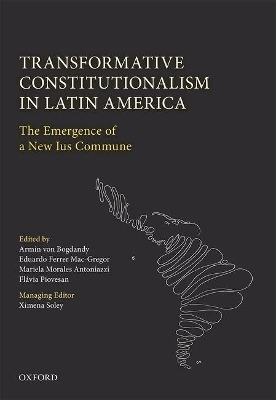
Transformative Constitutionalism in Latin America
Oxford University Press (Verlag)
978-0-19-879591-9 (ISBN)
This ground-breaking collection of essays outlines and explains the unique development of Latin American jurisprudence. It introduces the idea of the Ius Constitutionale Commune en América Latina (ICCAL), an original Latin American path of transformative constitutionalism, to an Anglophone audience for the first time. It charts the key developments that have transformed the region and assesses the success of the constitutional projects that followed a period of authoritarian regimes in Latin America.
Coined by scholars who have been documenting, conceptualizing, and comparing the development of Latin American public law for more than a decade, the term ICCAL encompasses themes that cross national borders and legal fields, taking in constitutional law, administrative law, general public international law, regional integration law, human rights, and investment law.
Not only does this volume map the legal landscape, it also suggests measures to improve society via due legal process and a rights-based, supranational and regionally rooted constitutionalism. The editors contend that with the strengthening of democracy, the rule of law, and human rights, common problems such as the exclusion of wide sectors of the population from having a say in government, as well as corruption, hyper-presidentialism, and the weak normativity of the law can be combatted more effectively in future.
Armin von Bogdandy is Director of the Max Planck Institute for Comparative Public Law and International Law in Heidelberg and Professor of Public Law at the University of Frankfurt/Main. He has been president of the OECD Nuclear Energy Tribunal as well as a member of the German Science Council and the Scientific Committee of the European Union Agency for Fundamental Rights; he has held visiting positions at the New York University School of Law, the European University Institute, the Xiamen Academy of International Law, and the National Autonomous University of Mexico, among others. Armin von Bogdandy is the recipient of the Leibniz Prize, the prize for outstanding scientific achievements in the field of legal and economic foundations by the Berlin-Brandenburg Academy of Sciences; the Premio Internacional "Hector Fix Zamudio,"; and the "Mazo" (gavel) of the Inter-American Court of Human Rights. His research centres on structural development in public law. Eduardo Ferrer Mac-Gregor is judge and vice-president of the Inter-American Court of Human Rights, as well as professor at the National Autonomous University of Mexico and researcher at the Legal Research Institute of that university. He studied law at the Autonomous University of Baja California obtained his PhD in law from the University of Navarra. He is director of the Iberoamerican Journal of Procedural Constitutional Law (Revista Iberoamericana de Derecho Procesal Constitucional). Mariela Morales Antoniazzi is a senior research fellow at the Max Planck Institute for Comparative Public Law and International Law in Heidelberg. She studies law at the Andrés Bello Catholic University, obtained her LLM at the University of Heidelberg and her PhD at the University of Frankfurt/Main. Mariela Morales Antoniazzi is visiting professor at various Latin American universities and vice-president of the German section of the Iberoamerican Institute of Constitutional Law. She coordinates the project Ius Constitutionale Commune en América Latina (ICCAL) at the Max Planck Institute for Comparative Public Law and International Law. Flávia Piovesan is professor of constitutional law and human rights at the Catholic University of São Paulo, where she holds a position in the human rights postgraduate programmes. She holds additional positions at the Catholic University of Paraná, and the human rights and development programme of Pablo de Olavide University, Spain. She was a human rights fellow at the Centre for Brazilian Studies, at the University of Oxford in 2005; and has been a visiting fellow at the Max Planck Institute for Comparative Public Law and International Law on numerous occasions. From 2009-2014 she was there as a Humboldt Foundation Georg Forster Research Fellow. Flávia Piovesan is a former member of the UN High Level Task Force on the implementation of the right to development and a member of the OAS Working Group working on the monitoring of the Protocol of San Salvador on social, economic and cultural rights. In 2016, she was appointed Special Secretary for Human Rights in Brazil.
INTRODUCTION; PART I: FRAMEWORK; PART II: THE DOMESTIC ELEMENT; PART III: THE INTER-AMERICAN ELEMENT
| Erscheinungsdatum | 28.09.2017 |
|---|---|
| Verlagsort | Oxford |
| Sprache | englisch |
| Maße | 179 x 252 mm |
| Gewicht | 1006 g |
| Themenwelt | Geisteswissenschaften ► Geschichte ► Regional- / Ländergeschichte |
| Recht / Steuern ► EU / Internationales Recht | |
| Recht / Steuern ► Öffentliches Recht | |
| Sozialwissenschaften ► Politik / Verwaltung ► Staat / Verwaltung | |
| ISBN-10 | 0-19-879591-2 / 0198795912 |
| ISBN-13 | 978-0-19-879591-9 / 9780198795919 |
| Zustand | Neuware |
| Haben Sie eine Frage zum Produkt? |
aus dem Bereich


